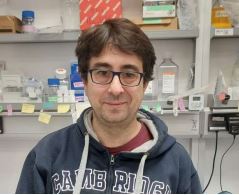SEMINARIO DE INSTITUTO
Parsing cell-type specific neuronal programs to treat mitochondrial disease
Ponente
Albert Quintana
Fecha y hora
10 de marzo 2023 12:30
Lugar
Aula 7 Facultad de Medicina UAM
Abstract
Mutations in genes encoding mitochondrial proteins result in mitochondrial disease (MD), a diverse group of orphan pathologies leading to neuromuscular deficits and death. Neurons are commonly affected in MD. However, there is a marked cell-specificity on the neuronal vulnerability to mitochondrial
dysfunction, and the underlying mechanisms leading to neuronal demise remain unknown, limiting our ability to develop effective treatments for these pathologies. Combining mouse genetics with novel molecular biology tools we have identified several neuronal populations particularly susceptible to
mitochondrial dysfunction in a mouse model lacking the mitochondrial complex I subunit Ndufs4 (Ndufs4KO mice), a model of Leigh Syndrome, a fatal untreatable pediatric mitochondrial disease. Using cell-type specific approaches, we have elucidated several concerted molecular mechanisms underlying
neuronal demise in vulnerable neurons, which has allowed us to propose novel treatments for MD
Affiliation and short bio

Albert Quintana is an Associate Professor of the Department of Cell Biology, Physiology and Immunology. He earned a Bachelor in Science in Biology (Biomedicine) in 2001 and a PhD in Neuroscience in 2007, both from the Universitat Autònoma de Barcelona. During his PhD focused on the role of cytokines in the development of neuropathology and neuroinflammation in traumatic brain injury. As a postdoc (2008-2013), he joined Dr. Richard Palmiter lab at the University of Washington in Seattle, where he was the lead scientist developing and characterizing a mouse model of mitochondrial disease (Leigh Syndrome). In 2013 he was appointed Assistant Professor in the Department of Pediatrics (University of Washington) and group leader at the Seattle Children’s Research Institute. In 2015 he
returned to the Universitat Autònoma de Barcelona as a Ramón y Cajal investigator and ERC grantee (Starting Grant), becoming and Associate professor in 2020. His research focuses on using a multi-level approach and to develop new tools to identify the molecular determinants of neuronal susceptibility to mitochondrial disease. He has authored over 50 research articles and 2 book chapters
Related publications with the topic
Aguilar K, Comes G, Canal C, Quintana A, Sanz E, Hidalgo J. 2022. Microglial response promotes neurodegeneration in the Ndufs4 KO mouse model of Leigh syndrome. Glia. 2022 Nov;70(11):2032- 2044. doi: 10.1002/glia.24234.
Bolea I, Gella A, Sanz E, Prada-Dacasa P, Menardy F, Bard AM, Machuca-Márquez P, Eraso-Pichot A, Mòdol-Caballero G, Navarro X, Kalume F, Quintana A. 2019. Defined neuronal populations drive fatal phenotype in a mouse model of Leigh syndrome. Elife. 8. pii: e47163.
Liu, L., Zhang, K., Sandoval, H., Yamamoto S, Jaiswal, M, Sanz, E, Zhihong Li, Hui J, Graham BH, Quintana, A., Bellen, H.J. 2015. Glial lipid droplets and ROS induced by mitochondrial defects promote neurodegeneration. Cell, 2015, 160(1-2), pp. 177–190.
Quintana, A, Kruse, S.E., Kapur, R.P., Sanz, E., Palmiter, R.D. 2010 Complex I deficiency due to loss of Ndufs4 in the brain results in progressive encephalopathy resembling Leigh syndrome. Proceedings of the National Academy of Sciences of the United States of America, 2010, 107(24), pp. 10996–11001
